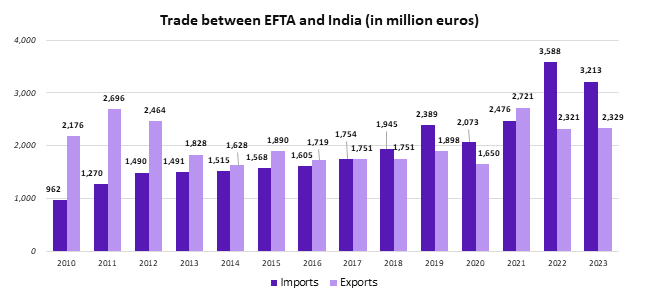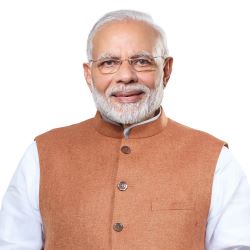
On March 10, 2024, India achieved a historic milestone by signing a pivotal trade agreement with the European Free Trade Association (EFTA), comprised of Iceland, Liechtenstein, Norway, and Switzerland.
The signing ceremony in New Delhi witnessed the participation of distinguished delegates including Guy Parmelin, Swiss Federal Councillor; Bjarni Benediktsson, Iceland’s Minister of Foreign Affairs; Dominique Hasler, Liechtenstein’s Minister of Foreign Affairs; and Jan Christian Vestre, Norway’s Minister of Trade and Industry. Leading the Indian delegation was Mr. Piyush Goyal, Union Minister for Commerce & Industry.
The successful conclusion of this agreement comes after 21 rounds of negotiations spanning over 15 years. Talks began in January 2008 and progressed through thirteen rounds until November 2013, after which negotiations were paused. However, negotiations resumed in October 2023 and the agreement was swiftly concluded in a fast-track mode.
Over the past two decades, the total trade between the EFTA States and India has been growing steadily. In 2023, the combined EFTA-India merchandise trade stood at USD 5.5 billion. The primary imports to the EFTA States consisted of organic chemicals (30.7%), while machinery (20%) and pharmaceutical products (10.7%), excluding gold, constituted the main exports to India. Furthermore, services trade and foreign direct investment have also reached substantial levels.

Source: Official website of EFTA trade statistics tool (https://www.efta.int/)
More details on each section available in the TEPA chapter by chapter factsheet here.
Aligns with EFTA and India’s “China Plus One” Strategy
This trade agreement aligns with India’s strategic goal of diversifying its trade partners beyond China. New Delhi views this pact as part of a broader initiative to strengthen export capacities and capitalize on evolving geopolitical dynamics, particularly with Western nations looking to reduce their reliance on Chinese trade. The agreement also supports EFTA nations in restructuring their supply chains away from China, leveraging India’s attractive investment environment amid global economic challenges.
High returns for EFTA Sovereign Funds and boost to FDI in India
The TEPA is expected to expand significant investments from EFTA nations, given the stature of investors like the Norwegian Sovereign Wealth Fund and Switzerland’s substantial investments in India, assuring security as well high returns amid a global recession scare. Unlike previous agreements, this pact includes provisions explicitly promoting targeted investments and job creation, marking a significant milestone in free trade agreement history. This investment influx could help offset India’s potential trade deficits with EFTA nations post-implementation.
Enhancing Import Diversification from China
Despite India’s efforts to boost local production in sectors like medical devices and pharmaceuticals, there’s room for growth. EFTA’s keen interest in joint ventures presents opportunities for India to reduce its dependency on Chinese imports. While certain clauses like data exclusivity are not part of the agreement, both pharmaceutical sectors stand to gain significantly, contributing to import diversification strategies for both EFTA and India.

Mr. Narendra Modi, Prime Minister, India
“Delighted by the signing of the India-EFTA Trade and Economic Partnership Agreement. This landmark pact underlines our commitment to boosting economic progress and creating opportunities for our youth. The times ahead will bring more prosperity and mutual growth as we strengthen our bonds with EFTA nations.”

Mr. Gahr Støre, Prime Minister, Norway
“This is a very important agreement for the business sector. India is the world’s fifth-largest economy and represents a huge market that will provide big export opportunities for Norwegian businesses. After the EEA agreement, this could become one of the most important trade agreements Norway has ever entered.”

Mr. Guy Parmelin, Federal Councilor and Head of the Federal Department of Economic Affairs, Switzerland
“EFTA countries gain market access to a major growth market. Our companies strive to diversify their supply chains while rendering them more resilient. India, in return, will attract more foreign investment from EFTA, which will ultimately translate into an increase in good jobs. All in all, the TEPA will allow us to make better use of our economic potential and create additional opportunities for both India and the EFTA States.”

Mr. Piyush Goyal, Union Minister for Commerce & Industry, India
“Embracing New Horizons! The India-EFTA Trade & Economic Partnership Agreement (TEPA) marks a historic milestone in our growing partnership with European Free Trade Association nations.”
This content offers a high-level synopsis of current events. It is intended to provide information only, not opinion, and it is not representative of any specific EGA work.
For further advisory and insights on stakeholder communication and government relations in India, reach out to anand.patel@edelmanega.com to learn more.